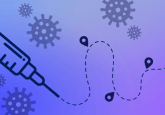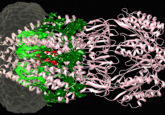DNA origami: the key to developing an effective HIV vaccine

Refer a colleague
Researchers have produced nanoscale virus-like particles made of DNA, by folding DNA in a process known as DNA origami, which they hope could lead to vaccines for HIV and other viruses. DNA origami, the nanoscale process of folding DNA into 2D and 3D shapes, has been utilized by researchers from the Massachusetts Institute of Technology (MA, USA) to produce particles similar to HIV with the ability to provoke an immune response from human immune cells in the lab. The DNA was folded to replicate the size and shape of an HIV virus and coated with HIV antigens. It is hoped...
To view this content, please register now for access
Join our member community for FREE to access a collection of journal and online-only features, including:
- Exclusive access to educational videos, eBooks and insights into top BioTechniques journal articles
- The latest news and journal updates delivered straight to your inbox when you want it
- Personalized recommendations for the latest member-exclusive podcasts, interviews and expert opinions
- Priority registration to webinars, panel discussions and events
- Access to competitions and journal publication discounts, including 10% off open access fees when you sign up today!
Please enter your username and password below, if you are not yet a member of BioTechniques remember you can register for free.





